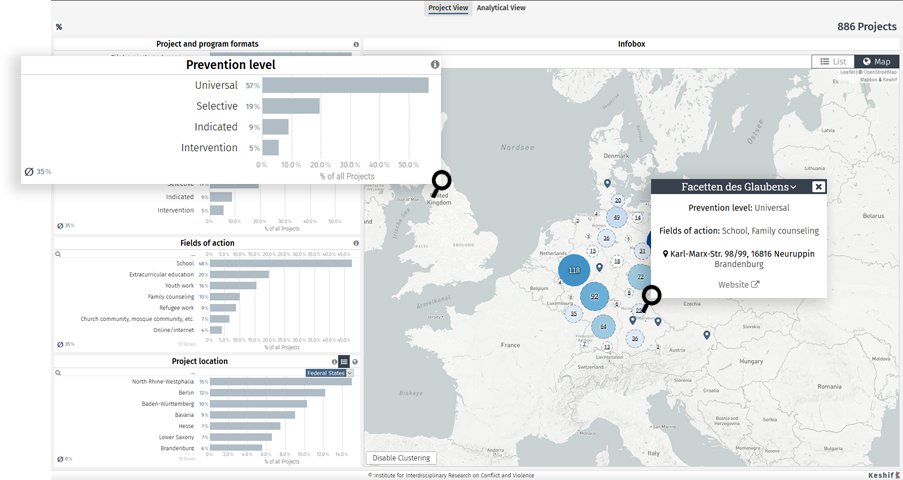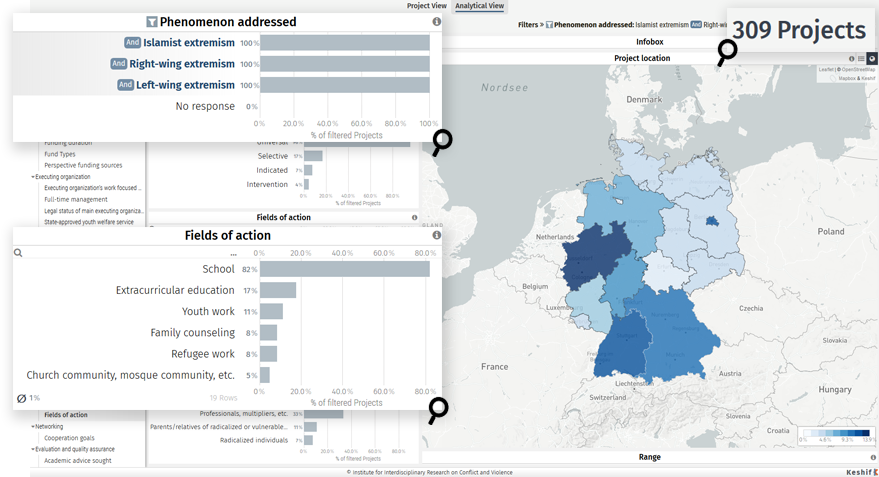Background and motivation
In response to the stark increase of religious and political extremism in the last years, we have seen enormous growth in prevention and intervention measures developed by state and civil society actors.
Approach and objectives
The MAPEX project set out to generate a nationwide overview of all publicly accessible prevention, deradicalization and distancing initiatives addressing Islamist extremism in Germany and to map these on an interactive and digital platform.
The survey covered all medium- and long-term projects and measures working to prevent religiously based radicalization (Islamism and/or neo-Salafism) or are engaged in distancing and deradicalization of Islamist extremists.
The survey also considered initiatives on a universal or primary prevention level working to combat devaluation of people on the basis of faith, origin or their Weltanschauung. These are projects that do not necessarily address a specific target or risk group but do exhibit an indirect relationship to the phenomenon.
For further information on data and methods please click here.
What MAPEX offers and could offer in the future
 The MAPEX platform consists of two different views or dashboards – the Project View and the Analytical View.
The MAPEX platform consists of two different views or dashboards – the Project View and the Analytical View.
The Project View shows all prevention actors in Germany that identified as relevant and also gave their consent to be included in the dashboard. The data can be filtered by prevention level, field of action and location. Projects and measures can be displayed on the map or as a list. Clicking on a marker (on the map) or a project name (in the list) opens a popup with a brief description, address and website.
 The Analytical View offers additional analysis and visualization options, for example to show how many projects and measures address multiple phenomena and at which prevention level, in which field of action and with which target groups. For data protection reasons, the Analytical View uses an anonymised dataset aggregated by state.
The Analytical View offers additional analysis and visualization options, for example to show how many projects and measures address multiple phenomena and at which prevention level, in which field of action and with which target groups. For data protection reasons, the Analytical View uses an anonymised dataset aggregated by state.
The MAPEX platform is using open standards and interfaces which allow the addition of comparative data, additional survey periods and phenomena, as well as the integration of socio-demographic and socio-economic data.
The mapping is complemented by four qualitative subprojects. These have different but interrelated topics and were each run by one of the consortium partners.
Associates
MAPEX was supported by seven associates: Bundesamt für Migration und Flüchtlinge (BAMF), Deutsche Stiftung Friedensforschung (DSF), Ufuq e. V., Landeskriminalamt Sachsen, Wegweiser e. V. in Düsseldorf, the interdisciplinary LOEWE research focus »Religiöse Positionierung« (religious positioning) (RelPos) in Frankfurt am Main, and Bundesarbeitsgemeinschaft religiös begründeter Extremismus (BAG RelEx).
MAPEX also cooperated with the DISLEX 3D project run by modus|zad (Analysing processes of distancing from three dimensions: A systematic approach).
There was also close collaboration with the research and transfer project PrEval – Evaluation designs for prevention measures coordinated by HSFK.

